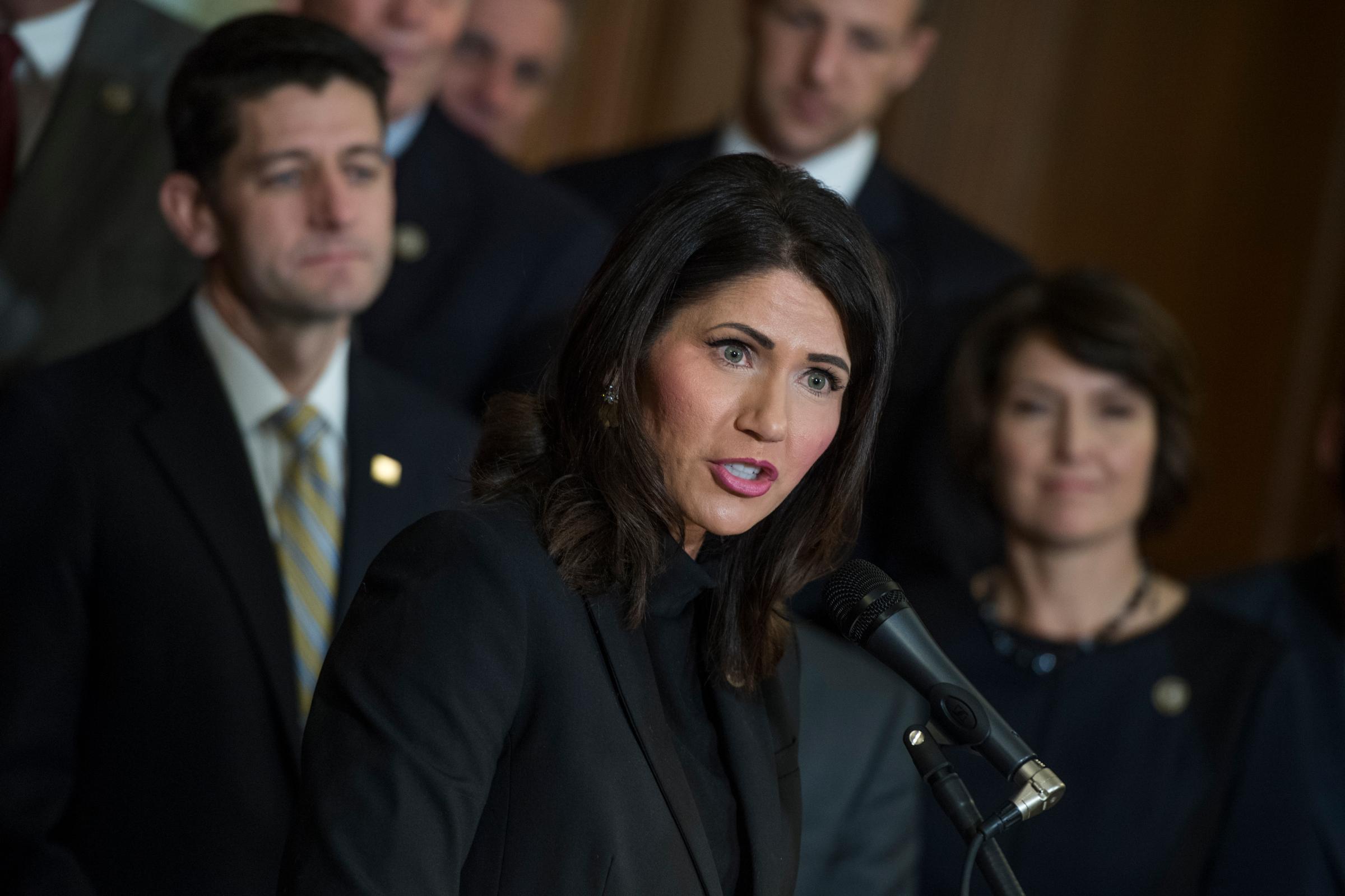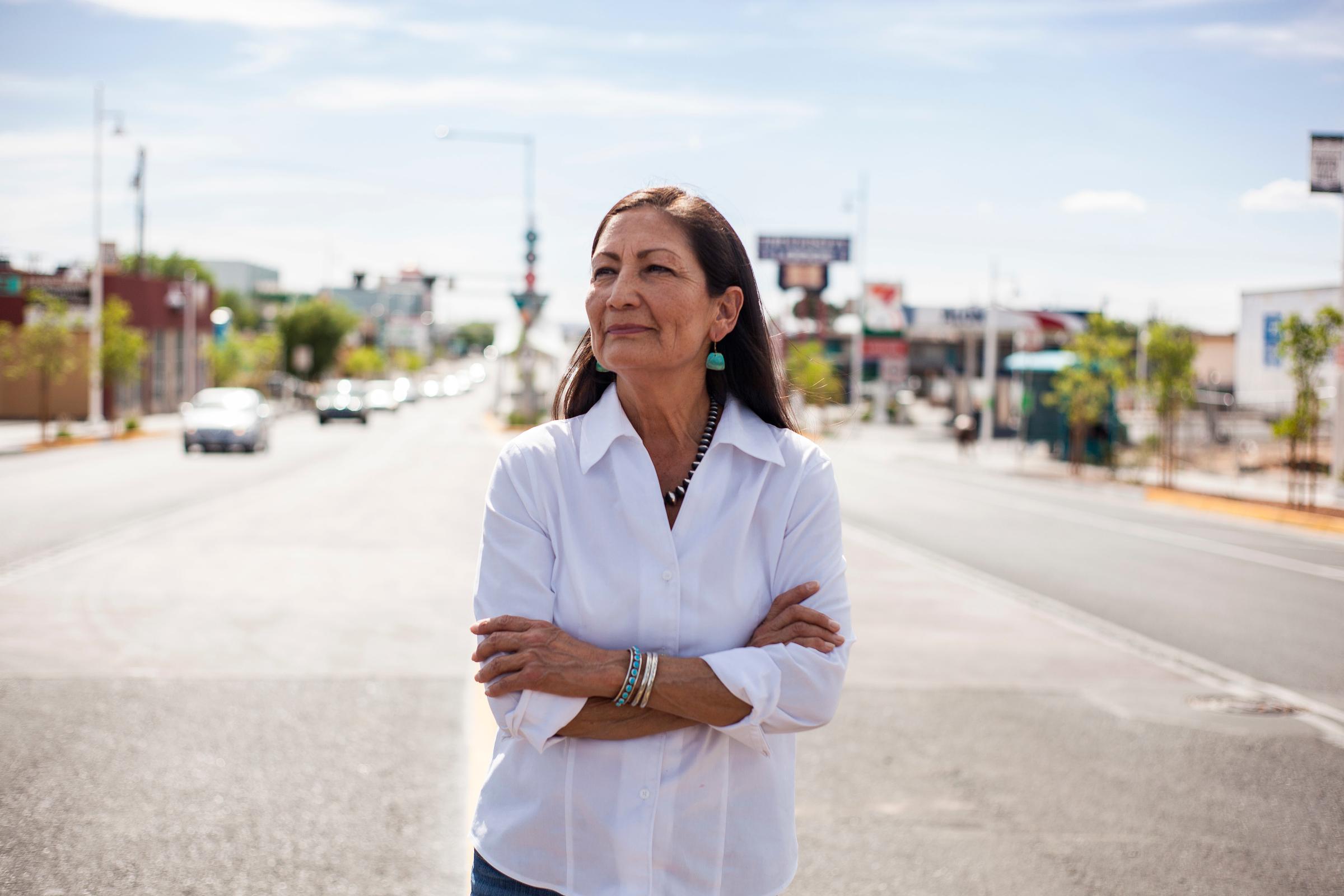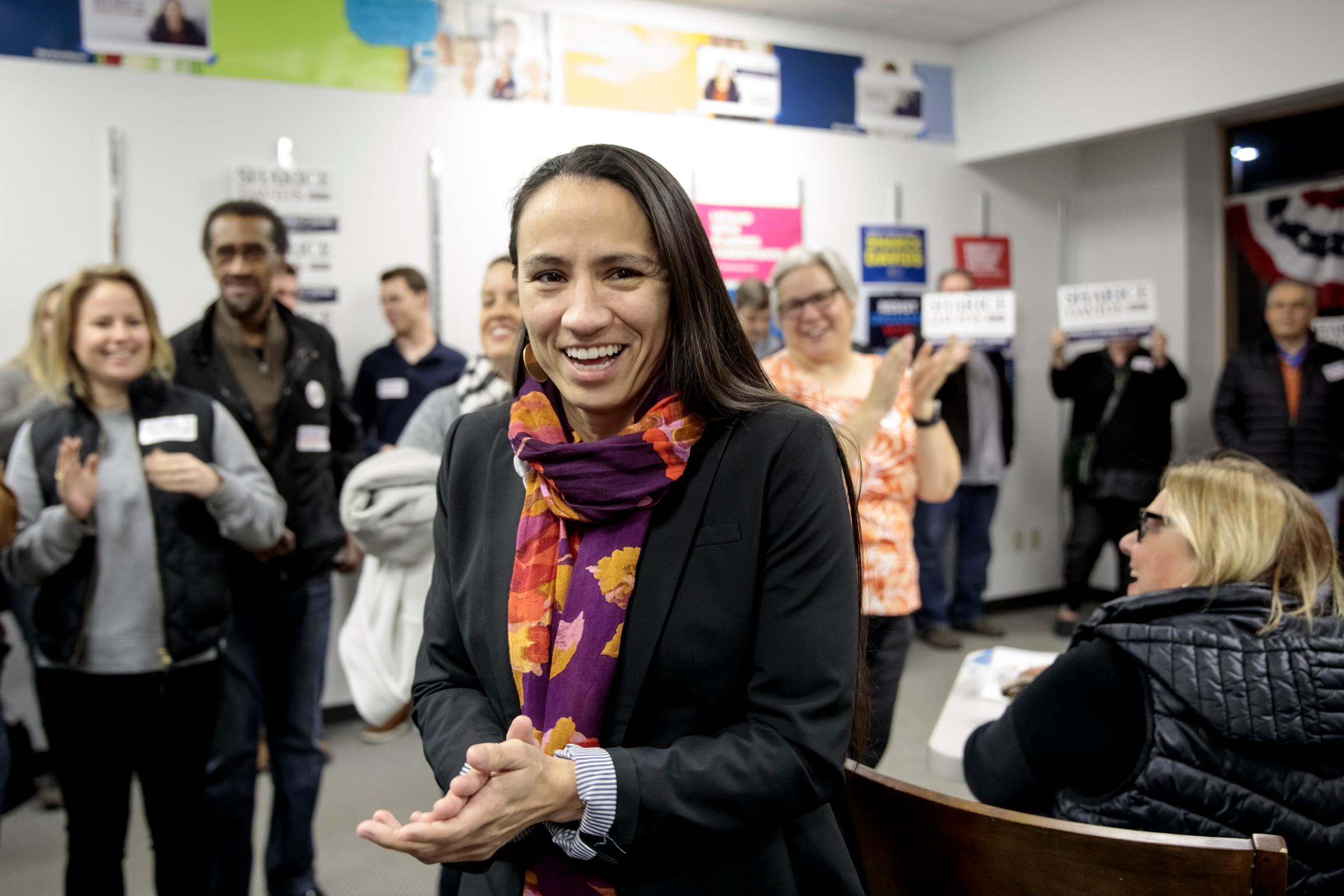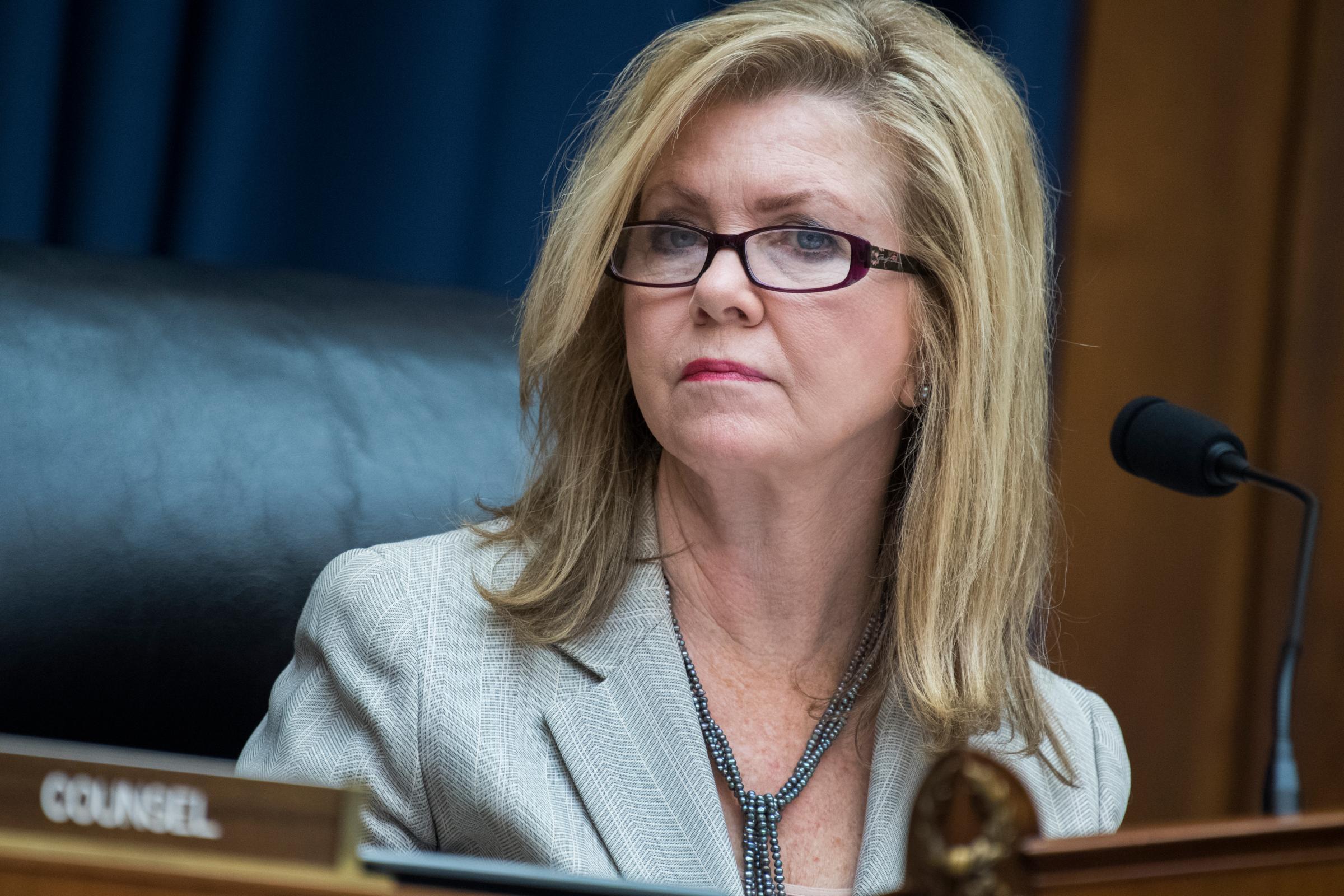Already in 2018, women candidates have broken the records for the number of candidates for governor, U.S. House and U.S. Senate. And that trend continued in the 2018 midterm elections.
The U.S. House of Representatives elected a record number of women, with at least 90 women expected to make their way to Washington, D.C. in January.
Individual candidates also achieved historic firsts. Democrats Ilhan Omar and Rashida Tlaib became the first Muslim women elected to Congress. Republican Marsha Blackburn became Tennessee’s first female Senator. Democrats Deb Haaland and Sharice Davids became the first Native American women elected to Congress. Republican Kristi Noem became South Dakota’s first female governor.
Some trailblazing candidates fell short — like Democratic Vermont gubernatorial candidate Christine Hallquist, who would have become the nation’s first openly transgender governor. Hallquist lost to incumbent governor Phil Scott, who has served since 2017, in the general election.
Here’s a closer look at some of the women who made — or could make — history in the 2018 midterms.
These candidates made history
Kyrsten Sinema

Became the first openly bisexual senator and the first female senator from Arizona.
Kyrsten Sinema, a Democrat currently representing Arizona in the House of Representatives, defeated Republican Martha McSally in the race for the Arizona senate seat vacated by retiring Republican Jeff Flake. Sinema became the first female senator and the first openly bisexual senator.
Sinema is known as a more moderate Democrat in the House, voting with Trump’s position nearly 60% of the time, according to FiveThirtyEight. She opposes Medicare for All and abolishing the Immigration and Customs Enforcement agency.
Sinema, a former social worker who was homeless for part of her childhood, became the first openly bisexual member of the U.S. House of Representatives in 2013.
Kristi Noem

Became South Dakota’s first female governor.
Republican Rep. Kristi Noem defeated Democrat Billie Sutton in the 2018 midterms to become South Dakota’s first female governor.
Her platform included improving the state’s economy and keeping the state free of income tax. During her campaign, Noem told CBS News that female voters don’t “just want to talk about women’s issues,” and said that she focused her campaign on her experience and ideas.
Deb Haaland

Became one of the first Native American women elected to Congress.
Democrat Deb Haaland, the former chairwoman of New Mexico’s Democratic Party, won New Mexico’s 1st Congressional District in the 2018 midterms. She defeated Republican Janice Arnold Jones in the district, which typically votes Democratic.
Haaland, a member of the Laguna Pueblo tribe, will become one of the first Native American women elected to Congress alongside Democrat Sharice Davids, who won Kansas’ 3rd Congressional District. Two Native American men — both Republicans — currently serve in the U.S. House of Representatives.
Haaland’s platform included advocating for Medicare for All, subsidizing early childhood care and education and protecting and expanding an Obama-era immigration policy that allowed people brought to the United States illegally as children to defer deportation.
“It’s not that native women haven’t tried. Ada Deer tried. Kalyn Free tried. Denise Juneau tried a couple years ago,” Haaland told TIME in June. “I’m not exceptional. I didn’t grow up with privilege. I almost feel like my winning is a shoutout to democracy everywhere.”
Sharice Davids

Became the first Native American woman ever elected to Congress.
Democrat Sharice Davids became the first Native American woman elected to Congress after defeating four-term Republican incumbent Rep. Kevin Yoder for Kansas’ 3rd Congressional District seat in the 2018 midterms.
Davids, a member of Wisconsin’s Ho-Chunk Nation tribe and an open lesbian, is also the first openly LGBT person to represent Kansas in Congress. Her win comes amid renewed discussions about the barriers Native Americans face while voting in the U.S.
Marsha Blackburn

Became Tennessee’s first female Senator.
Republican Marsha Blackburn, who currently serves in the U.S. House of Representatives, became Tennessee’s first female senator after winning retiring Republican Sen. Bob Corker’s Senate seat in the 2018 midterms. The state has elected six total women to the U.S. House of Representatives.
Blackburn, who has received support from President Donald Trump, defeated Democratic candidate Phil Bredesen, who served as Tennessee’s governor from 2003 to 2011.
Despite her history-making win, Blackburn has made a point not to highlight her gender. She famously preferred to be called “congressman” when she entered the House, and she told the Washington Post in May when asked about the potential significance of her Senate bid: “I don’t campaign on the gender issue.” But a spokesperson for her campaign did say that anyone who doubted her ability to win in November was “just a plain sexist pig.”
Rashida Tlaib

Became one of the first Muslim women in Congress and the first Palestinian-American woman in Congress.
Rashida Tlaib, a Democratic Michigan state representative, became one of the first Muslim women in Congress after winning Michigan’s 13th Congressional District in the 2018 midterms. She ran unopposed after winning the Democratic nomination for former Rep. John Conyers’ seat in Congress in August.
It’s a distinction she will share with Ilhan Omar, who won a Congressional seat in Minnesota’s 5th Congressional District.
Tlaib was born to Palestinian immigrants in Detroit and served in the Michigan House from 2009 to 2014. She also worked as an attorney as the Sugar Law Center for Economic and Social Justice. Her platform included immigration reform, Medicare for all, a $15 minimum wage and debt-free higher education.
Ilhan Omar
Became the first Somali-American in Congress and one of the first Muslim women in Congress.
Ilhan Omar became the first Somali-American Muslim person to become a legislator when she was elected to the Minnesota House of Representatives in 2016 as a Democrat. And now, she’s first Somali-American in Congress. She defeated Republican Jennifer Zielinski in the 2018 midterms.
Omar, who came to the U.S. as a refugee, is also one of the first Muslim women in Congress, a distinction she shares with Rashida Tlaib, who won a seat for Michigan’s 13th Congressional District.
Alexandria Ocasio-Cortez
Became the youngest woman elected to Congress.
Alexandria Ocasio-Cortez, a 29-year-old activist from the Bronx, became the youngest woman elected to Congress in the 2018 midterms, defeating Republican Anthony Pappas in the race for New York’s 14th Congressional Distrct. In June, Ocasio-Cortez pulled off a stunning upset in the primary for the seat, defeating 10-term congressman Joe Crowley.
Republican Elise Stefanik previously held the distinction: she was elected to the House of Representatives in 2014 at age 30. Aside from her age, Ocasio-Cortez has attracted attention for her platform, which she described as democratic socialism. She has advocated for Medicare for All, a $15 minimum wage and housing as a human right, among other things.
Ayanna Pressley

Became the first black Congresswoman from Massachusetts.
Ayanna Pressley, the first black woman to serve on Boston’s City Council, became the first black Congresswoman from Massachusetts in the 2018 midterm elections. She had no Republican challenger.
Pressley defeated 10-term Democratic congressman Michael Capuano in the Democratic primary for Massachusetts’ 7th district on Sept. 4.
Pressley argued that her majority-minority district should be represented by a person of color. Her platform differed little from Capuano, who has been a consistent progressive vote in Congress. As a sexual assault survivor, Pressley has fought to end sexual violence and gun violence. She also advocated for defunding Immigration and Customs Enforcement and Medicare for All.
Lou Leon Guerrero
Became the first female governor of Guam.
Democrat Lou Leo Guerrero, the current President of the Bank of Guam, will become the first female governor of Guam after winning the gubernatorial election on Nov. 6. Guerrero defeated Republican Ray Tenorio, the state’s current Lieutenant Governor. She won with just over 50% of the vote, preventing a runoff.
“We are extremely grateful for the opportunity given to us to make a positive change for all our people,” Leon Guerrero said, per the Pacific Daily News.
Guam has been led by Republican governors since 2003. Leon Guerrero’s platform included restoring trust in the government, giving small businesses more tax breaks and conducting a pay study for public school teachers, according to the Pacific Daily News.
More Must-Reads from TIME
- Donald Trump Is TIME's 2024 Person of the Year
- Why We Chose Trump as Person of the Year
- Is Intermittent Fasting Good or Bad for You?
- The 100 Must-Read Books of 2024
- The 20 Best Christmas TV Episodes
- Column: If Optimism Feels Ridiculous Now, Try Hope
- The Future of Climate Action Is Trade Policy
- Merle Bombardieri Is Helping People Make the Baby Decision
Write to Samantha Cooney at samantha.cooney@time.com